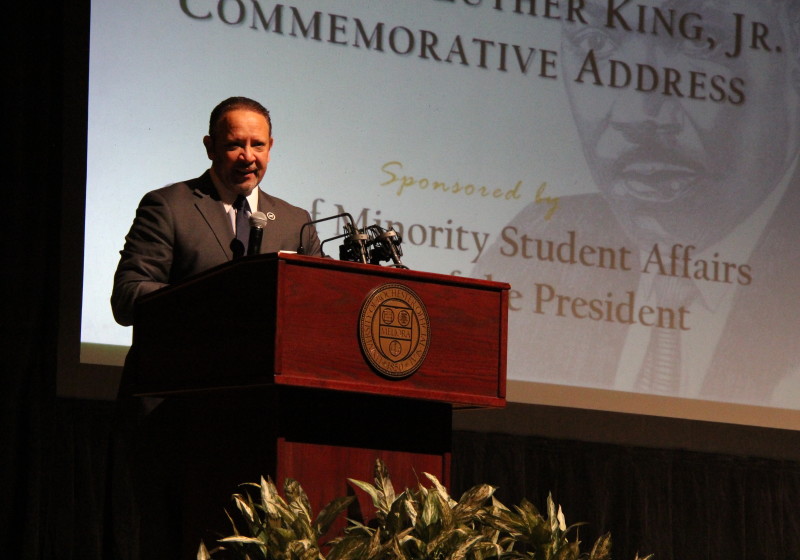Douglass Leadership House had an especially distinguished guest on Monday—Marc Morial, President and CEO of the National Urban League and former mayor of New Orleans—who delivered the (delayed) Martin Luther King Jr. Day commemorative address later that evening.
He also had a Q&A with students earlier in the afternoon.
Morial joked about his once-in-a-lifetime Leap Day address and visiting Rochester for the weather before he discussed the true themes he would be addressing in his speech. He introduced himself to every student personally, asking their names and hometowns.
Throughout his conversation with the students, Morial stressed the power of young leaders to bring about change: In the 1960s, with leaders such as Dr. Martin Luther King Jr., John Lewis, and President John F. Kennedy; during Morial’s own tenure as mayor of New Orleans from 1994-2002; and today, with the new generation of activists.
Several students were interested in Morial’s own experience as a student activist during his undergraduate years at the University of Pennsylvania. He said the importance of finding a balance between classwork and activist involvement, explaining that it was a balance extending far beyond campus and graduation.
One student asked for Morial’s thoughts on the issues being protested today versus those being protested in the Civil Rights era, explaining that many people accuse college students of being more sensitive in this day and age. “Justice, fairness, and inclusion are always relevant,” Morial responded. He continued, saying that things are better now than they were a generation ago, and the same could be true of his parents’ generation. “Every generation has a responsibility and a mission to improve things.”
Morial emphasized the importance of having an education, both formal and self-taught, taking advantage of the resources available to students today to educate themselves about the events of the past. He also spoke to the importance of recognizing different roles within activism, saying that not everyone needs to be on the front lines, or in the public eye.
“Protesting is a tactic,” said Morial. “Activism is a mindset.”
Later in the day, Morial gave his address at UR’s Bloch Alumni and Advancement Center on East River Road. The MLK Commemorative Address is usually held in Strong Auditorium, on the River Campus. Due to the off-campus location, University shuttles were provided to ferry students from the River Campus to the venue.
The speech began just after 6 p.m., with several introductions by UR dignitaries. Dean and Director of Minority Student Affairs Norman Burnett began, followed by UR President Joel Seligman.
Seligman took a few moments to recognize the recipients of the 2016 Presidential Diversity Award, which is announced each year at the MLK commemorative address. This year’s winners were Dean of the School of Nursing Kathy Rideout, Manager of Staff Diversity Inclusion and Engagement Janice Holland, and the One Community program, a freshman orientation initiative responsible for hosting racial sensitivity discussions during orientation.
Senior Farid Adenuga, President of the Minority Student Advisory Board and member of the MLK Program planning committee, spoke next, welcoming Morial to the stage.
Morial began his speech as an homage to King, speaking on the civil rights leader’s contributions to America. He noted that, while not unflattering, the “popular caricature” of King is also incomplete. It’s easy to think of King solely as a great speaker, Morial noted, but many Americans may be unaware of King’s gifts as a strategist “who didn’t mind working against the grain” to bring the goal of racial equality to fruition.
Before Rosa Parks’ arrest in 1955, Morial said, Civil Rights leaders such as Thurgood Marshall had believed that the path to equality was a gradual one that would slowly integrate American society. Court decisions like Brown v. Board of Education were supposed to be the force for integration, and King’s boycotts and more active methods flew in the face of this thinking.
In a short Q&A session following the address, Morial addressed the modern economic disparity between whites and African-Americans, noting that whites recovered fastest from the 2008 economic recession. He argued for more investment in American cities as well as equal funding for public schools.
Morial concluded his speech by tying King’s 1960s activism to the America of today. If King were alive today, Morial argued, he would be pleased with racial progress—but still not satisfied.



